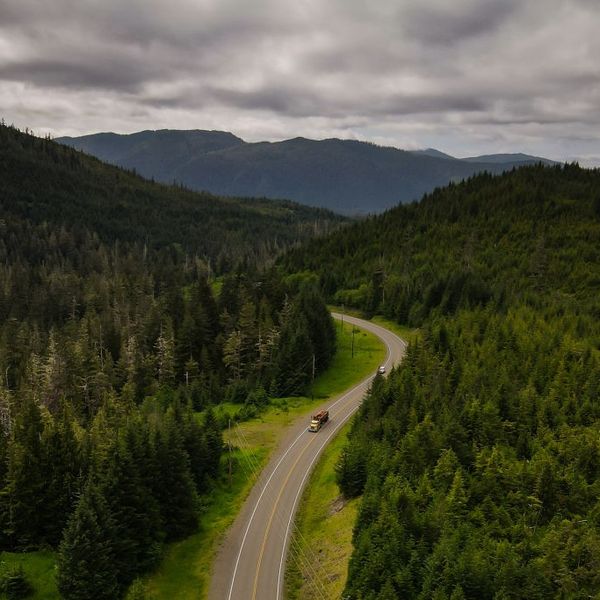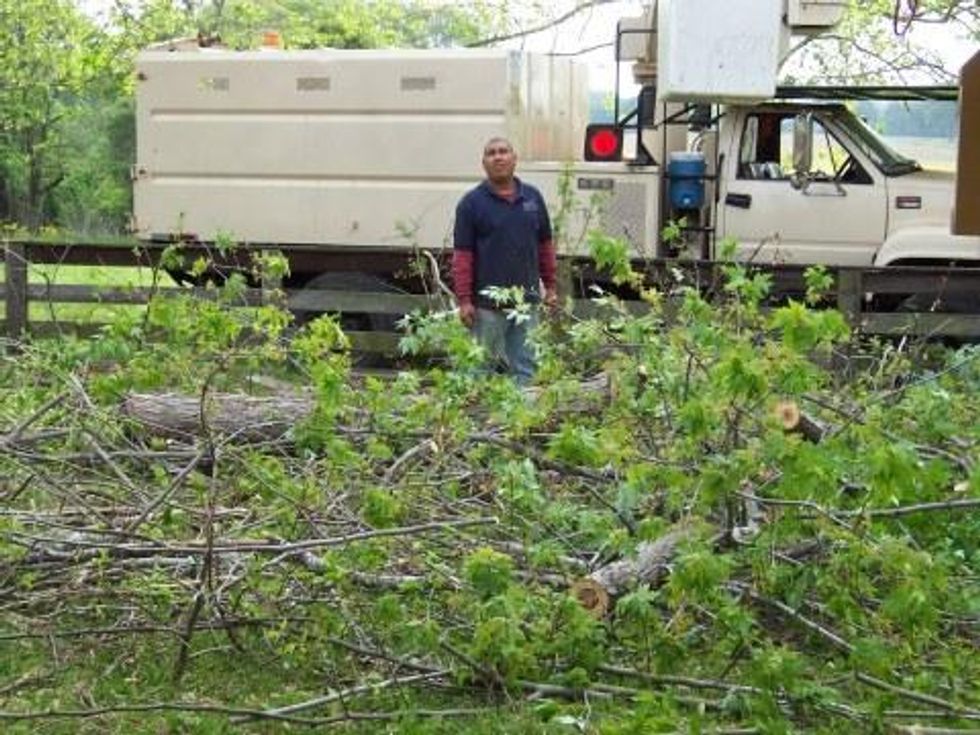Out of the Mouths of Babes...
In her new book, Joining the Resistance, distinguished psychologist Carol Gilligan shows that as girls and boys mature, they lose touch with the instinctive, joyful, totally honest voice they were born with.
To some extent, this is necessary. No one would want to live in a chaotic society of adult two-year-olds all shouting and crying and singing at the top of their lungs whenever they felt like it!
But it's the loss of honesty that I find troubling, because it appears that when we lose touch with our own honest assessment of people and situations, we also lose the belief in our power to effect change.
***
When I was a young girl I was very sensitive to others' pain, and it didn't matter to me whether I was witnessing a tree being cut or a seal being tortured by a fishing net, I felt the pain so deeply that it became a wound in the innermost recesses of my own soul.
I'll never forget one beautiful spring morning, when I was about nine years old. My family lived in the city, and we always arrived at our country house on Friday nights, in the dark. On Saturday mornings it was my habit to get up early and go out for a walk by myself, reveling in the woods and fields and birdsong that I had missed during the week in the concrete canyons of New York.
On this particular May morning, full of sunshine and the fresh, moist air of spring, my buoyant good cheer was suddenly shattered by a shocking sight by the side of our driveway. The telephone company had come during the week while we were away and cut down a big swath of young trees underneath the cables that ran along the road, leaving behind heaps of dying limbs and saplings, heavy with oozing sap and shriveling new leaves.
A gut-wrenching feeling of horror clutched at me; I began crying, crooning to the trees, overwhelmed with a feeling of shame and guilt--why were my people, humans, so destructive, so wanton, so careless and thoughtless? I was outraged, upset, furious, and went running back up the driveway to tell my parents, assuming they would share my reaction.
But instead they shrugged, resigned--it was too bad, but there was nothing to be done about it.
***
And of course now, as an adult, my reaction would be the same. I witness road crews cutting back perfectly healthy trees all the time, and think nothing of it.
As we grow up, we get inured to the pain and suffering we visit on the natural world day after day. We learn to tolerate injustice with casual lack of attention. We lose the moral sensitivity with which we are born, and with it the fire within that impels little children to speak their truths and demand that the adults in their lives listen.
Told that it doesn't matter whether some trees are cut, or a cell tower goes up, or a dam is built, or that there is so much artificial light at night that we can no longer see the stars, we are gradually lulled, as adults, into complacency, from which it takes a lot to dislodge us.
This is no accident. Most educational practices consist of training the young to conform to authority and feed back the right answers to the questions asked.
It's not about learning how to ask the questions that haven't yet been formulated; the questions that come from one's deepest reservoirs of knowledge.
Socrates believed that human beings enter the world already knowing everything we need to know, but we forget it in the first weeks of life. We spend the rest of our lives, he believed, trying to remember.
As children, we know that we humans were born to live in harmony with the other living beings on this planet; to be a productive and positive part of the web of life that surrounds and sustains us.
Adults, I'm speaking to you: this is crucial knowledge that we need to remember, and act upon.
An Urgent Message From Our Co-Founder
Dear Common Dreams reader, The U.S. is on a fast track to authoritarianism like nothing I've ever seen. Meanwhile, corporate news outlets are utterly capitulating to Trump, twisting their coverage to avoid drawing his ire while lining up to stuff cash in his pockets. That's why I believe that Common Dreams is doing the best and most consequential reporting that we've ever done. Our small but mighty team is a progressive reporting powerhouse, covering the news every day that the corporate media never will. Our mission has always been simple: To inform. To inspire. And to ignite change for the common good. Now here's the key piece that I want all our readers to understand: None of this would be possible without your financial support. That's not just some fundraising cliche. It's the absolute and literal truth. We don't accept corporate advertising and never will. We don't have a paywall because we don't think people should be blocked from critical news based on their ability to pay. Everything we do is funded by the donations of readers like you. The final deadline for our crucial Summer Campaign fundraising drive is just days away, and we’re falling short of our must-hit goal. Will you donate now to help power the nonprofit, independent reporting of Common Dreams? Thank you for being a vital member of our community. Together, we can keep independent journalism alive when it’s needed most. - Craig Brown, Co-founder |
In her new book, Joining the Resistance, distinguished psychologist Carol Gilligan shows that as girls and boys mature, they lose touch with the instinctive, joyful, totally honest voice they were born with.
To some extent, this is necessary. No one would want to live in a chaotic society of adult two-year-olds all shouting and crying and singing at the top of their lungs whenever they felt like it!
But it's the loss of honesty that I find troubling, because it appears that when we lose touch with our own honest assessment of people and situations, we also lose the belief in our power to effect change.
***
When I was a young girl I was very sensitive to others' pain, and it didn't matter to me whether I was witnessing a tree being cut or a seal being tortured by a fishing net, I felt the pain so deeply that it became a wound in the innermost recesses of my own soul.
I'll never forget one beautiful spring morning, when I was about nine years old. My family lived in the city, and we always arrived at our country house on Friday nights, in the dark. On Saturday mornings it was my habit to get up early and go out for a walk by myself, reveling in the woods and fields and birdsong that I had missed during the week in the concrete canyons of New York.
On this particular May morning, full of sunshine and the fresh, moist air of spring, my buoyant good cheer was suddenly shattered by a shocking sight by the side of our driveway. The telephone company had come during the week while we were away and cut down a big swath of young trees underneath the cables that ran along the road, leaving behind heaps of dying limbs and saplings, heavy with oozing sap and shriveling new leaves.
A gut-wrenching feeling of horror clutched at me; I began crying, crooning to the trees, overwhelmed with a feeling of shame and guilt--why were my people, humans, so destructive, so wanton, so careless and thoughtless? I was outraged, upset, furious, and went running back up the driveway to tell my parents, assuming they would share my reaction.
But instead they shrugged, resigned--it was too bad, but there was nothing to be done about it.
***
And of course now, as an adult, my reaction would be the same. I witness road crews cutting back perfectly healthy trees all the time, and think nothing of it.
As we grow up, we get inured to the pain and suffering we visit on the natural world day after day. We learn to tolerate injustice with casual lack of attention. We lose the moral sensitivity with which we are born, and with it the fire within that impels little children to speak their truths and demand that the adults in their lives listen.
Told that it doesn't matter whether some trees are cut, or a cell tower goes up, or a dam is built, or that there is so much artificial light at night that we can no longer see the stars, we are gradually lulled, as adults, into complacency, from which it takes a lot to dislodge us.
This is no accident. Most educational practices consist of training the young to conform to authority and feed back the right answers to the questions asked.
It's not about learning how to ask the questions that haven't yet been formulated; the questions that come from one's deepest reservoirs of knowledge.
Socrates believed that human beings enter the world already knowing everything we need to know, but we forget it in the first weeks of life. We spend the rest of our lives, he believed, trying to remember.
As children, we know that we humans were born to live in harmony with the other living beings on this planet; to be a productive and positive part of the web of life that surrounds and sustains us.
Adults, I'm speaking to you: this is crucial knowledge that we need to remember, and act upon.
In her new book, Joining the Resistance, distinguished psychologist Carol Gilligan shows that as girls and boys mature, they lose touch with the instinctive, joyful, totally honest voice they were born with.
To some extent, this is necessary. No one would want to live in a chaotic society of adult two-year-olds all shouting and crying and singing at the top of their lungs whenever they felt like it!
But it's the loss of honesty that I find troubling, because it appears that when we lose touch with our own honest assessment of people and situations, we also lose the belief in our power to effect change.
***
When I was a young girl I was very sensitive to others' pain, and it didn't matter to me whether I was witnessing a tree being cut or a seal being tortured by a fishing net, I felt the pain so deeply that it became a wound in the innermost recesses of my own soul.
I'll never forget one beautiful spring morning, when I was about nine years old. My family lived in the city, and we always arrived at our country house on Friday nights, in the dark. On Saturday mornings it was my habit to get up early and go out for a walk by myself, reveling in the woods and fields and birdsong that I had missed during the week in the concrete canyons of New York.
On this particular May morning, full of sunshine and the fresh, moist air of spring, my buoyant good cheer was suddenly shattered by a shocking sight by the side of our driveway. The telephone company had come during the week while we were away and cut down a big swath of young trees underneath the cables that ran along the road, leaving behind heaps of dying limbs and saplings, heavy with oozing sap and shriveling new leaves.
A gut-wrenching feeling of horror clutched at me; I began crying, crooning to the trees, overwhelmed with a feeling of shame and guilt--why were my people, humans, so destructive, so wanton, so careless and thoughtless? I was outraged, upset, furious, and went running back up the driveway to tell my parents, assuming they would share my reaction.
But instead they shrugged, resigned--it was too bad, but there was nothing to be done about it.
***
And of course now, as an adult, my reaction would be the same. I witness road crews cutting back perfectly healthy trees all the time, and think nothing of it.
As we grow up, we get inured to the pain and suffering we visit on the natural world day after day. We learn to tolerate injustice with casual lack of attention. We lose the moral sensitivity with which we are born, and with it the fire within that impels little children to speak their truths and demand that the adults in their lives listen.
Told that it doesn't matter whether some trees are cut, or a cell tower goes up, or a dam is built, or that there is so much artificial light at night that we can no longer see the stars, we are gradually lulled, as adults, into complacency, from which it takes a lot to dislodge us.
This is no accident. Most educational practices consist of training the young to conform to authority and feed back the right answers to the questions asked.
It's not about learning how to ask the questions that haven't yet been formulated; the questions that come from one's deepest reservoirs of knowledge.
Socrates believed that human beings enter the world already knowing everything we need to know, but we forget it in the first weeks of life. We spend the rest of our lives, he believed, trying to remember.
As children, we know that we humans were born to live in harmony with the other living beings on this planet; to be a productive and positive part of the web of life that surrounds and sustains us.
Adults, I'm speaking to you: this is crucial knowledge that we need to remember, and act upon.


